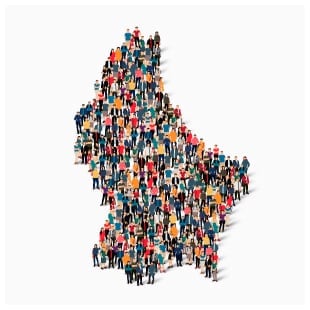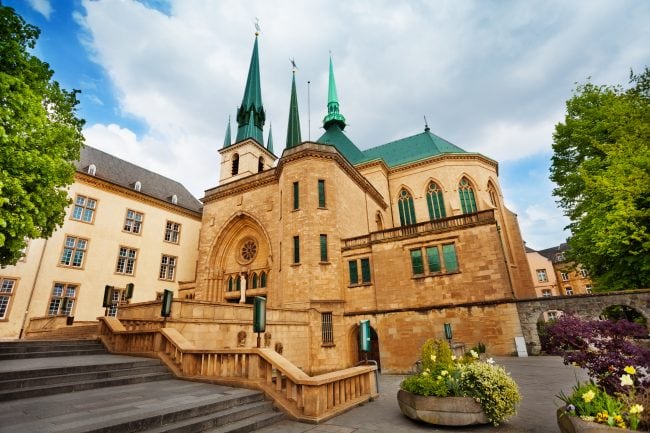Almost half of Luxembourg's population is foreign, with strong demographic growth due to constant immigration in search of work.
Population of Luxembourg on January 1, 2024
Strong population growth in Luxembourg
While Luxembourg may appear to be one of Europe's smallest and least populous countries, its population is growing strongly every year.
On January 1, 2024, Luxembourg reached a population of 672,050. This represents a year-on-year increase of just 1.7%, the lowest rate in a decade. In 1961, the number of inhabitants in Luxembourg stood at 314,900, equivalent to a doubling of the population in the space of 60 years.
Studies by STATEC, the Grand Duchy of Luxembourg's national statistics and economic studies institute, predict a population of over 1 million people in 2060 in an area of just 2,586 km2 !
A young, male, foreign population
Today, 80% of Luxembourg's population growth is due to immigration. The proportion of foreigners living in Luxembourg stood at 47.3% on January 1, 2024. In 1961, the proportion of foreigners was just 13.2%.
Luxembourg attracts a young, male foreign population in search of professional opportunities. Luxembourg's foreign population is now younger on average than the native Luxembourg population.
Men make up over 50% of the population, with an average age of 39 compared with 40.4 for women.
Reasons for the influx of people to Luxembourg
Luxembourg's quality of life
Expatriates regularly rank Luxembourg among the top 10 countries to live in. Luxembourg enjoys an excellent quality of life. The Grand Duchy of Luxembourg is recognized as one of the safest countries in the world.
Life expectancy in Luxembourg is 81 years for men and 85 years for women. Luxembourg is one of the few countries to have increased its life expectancy in recent years, despite the Covid health crisis. It has to be said that Luxembourg's healthcare system is highly efficient.
Social and family policy is also valued. Social benefits are important.
Young professionals attracted by job prospects
One-fifth of Luxembourg's population lives in the capital Luxembourg. It is the largest economic area.
The Luxembourg job market is dynamic. Young professionals find attractive career opportunities and income prospects in Luxembourg. The Grand Duchy continues to attract an active population in search of employment.
On the other hand, property prices are high, reaching levels comparable to London and Paris in some areas. Housing is becoming increasingly difficult to come by.
See where immigrants settle when they arrive in Luxembourg.
Luxembourg's economic appeal to migrants
Historical immigration
Luxembourg has long been a welcoming place for immigrants looking for work.
As early as the 19th century, many Italians immigrated tosouthern Luxembourg to work in the iron ore mines. The movement continued until the mid-sixties.
The Portuguese then arrived in Luxembourg in several waves, corresponding to Portugal's crises: the late 1960s, 1975-1982, 2003-2009. Today, they represent the largest foreign community in Luxembourg.
From 2014 onwards, French immigration takes over. The French will represent the largest migrant population in 2019 and 2020.
In 2021, the Portuguese will once again be the leading community to settle in Luxembourg, with 3,885 new arrivals. In the same year, the French come second, with 3,590 immigrants.
Many Brazilians have also taken advantage of changes in the laws governing the acquisition of Luxembourg nationality.
These days, it seems fairly straightforward to settle and integrate in Luxembourg.
Recent migration flows to Luxembourg
Positive migration flows
In 2022, Ukrainians will represent the largest migratory influx, with over 4,200 new arrivals on Luxembourg soil. Ukrainians numbered 5,338 nationals on January 1, 2023, as a result of the war waged by Russia on Ukrainian territory since February 2022.
Italians will represent the 2nd largest migratory flow in 2022, with over 900 new arrivals.
Syrians, who are also refugees on Luxembourg soil, represent the 3rd largest incoming migratory flow, with over 800 new residents.
Negative migration flows
The year 2022 marks a reversal in migration trends, confirmed in 2023. Net migration is now negative. More and more Luxembourgers are leaving the country: more than 3,100 Luxembourgers left the country in 2023, while only 1,820 returned. The Portuguese are the second largest community to leave the country, followed by the French.
The housing crisis and soaring property prices are driving low-income earners out of Luxembourg and into the Greater Region.
A multicultural Luxembourg society
One of the major characteristics of Luxembourg's population is its high proportion of foreigners. Over 47% of the population is foreign. People who have acquired Luxembourg nationality are counted among the Luxembourg population.
Foreign communities in Luxembourg
Today, more than 170 different nationalities coexist in Luxembourg, mainly of European origin.
Foreign communities most represented in Luxembourg
The three largest foreign communities in Luxembourg are :
- The Portuguese represent the 1st foreign community, with 13.5% of the Luxembourg population and 90,915 nationals.
- The French community is the 2nd largest foreign community, with a population of 49,234, or 7.3% of the Grand Duchy's population,
- the Italian community with 3.7% of the population, or 25,116 people
- the Belgian community with over 18,889 residents,
- the German community with 12,480 people
- the Spanish community (9,540 residents)
- the Romanian community (6,828 residents)
- Ukrainian community (5,357 residents)
- the Polish community (5,217 residents)
- the Indian community with 5,091 residents
- the Chinese community with 4,545 residents
- the Greek community with 4,472 inhabitants
- the Dutch community (3,934 inhabitants)
- the British community (3,739 inhabitants versus 5,766 in 2020, a 35% drop since the Brexit)
Other foreign communities in Luxembourg (2023 figures)
The Baltic and Scandinavian communities represent almost 7,200 people in Luxembourg.
The Asian communities represent 23,678 people in Luxembourg, i.e. 3.5% of the population, the Africans 17,507 people (2.6% of the population), the Americans 8,565 people, including nearly 3,000 North Americans, and the Australians and Oceanians 271 people.
The proportion of Luxembourgers remains stable at around 53%.
Languages spoken in Luxembourg
As soon as you arrive in Luxembourg, you're struck by the diversity of languages spoken in public spaces. This is due to the strong presence of foreigners and above all to the ability of Luxembourgers to speak several languages.
The French Ministry of Education showed in 2018 that 98% of the population speaks French. English is spoken by 80%. German and Luxembourgish are used at 78 and 77%.
There are 3 official languages in Luxembourg:
- Children speak Lëtzebuergesch from the moment they start school. Lëtzebuergesch has been the national language since 1984. It is used as the language of everyday exchanges. Knowledge of Lëtzebuergesch is a prerequisite for naturalization .
- Children learn German as soon as they start elementary school. German is the language of literacy and reading. It is also traditionally the language of newspapers,
- Children learn French from the 2nd year of elementary school, in addition to German. French is now introduced as an oral language in nursery and kindergarten. Since the start of the 2022 school year, pilot schools in southern Luxembourg have been testing French-language literacy. The system will be extended for the next school year.
The French TV5 Monde program "Destination francophonie au Luxembourg" (Destination Francophonie in Luxembourg) shows language learning inLuxembourg's primary schools.
What's more, from the moment they enter the Luxembourg school system, foreign children benefit from language support to facilitate their integration.
Would you like to learn the reference languages in Luxembourg? We offer a wide range of language courses.
Luxembourg's population is predominantly Christian
According to the latest studies on the subject, Christians represent 44% of the total population of Luxembourg. Over 90% of them are Catholics.
The Muslim religion has been on the rise in recent years. Nearly 3% of Luxembourg's population is Muslim. These people are mainly from the former Yugoslavia.
For over 75% of the population, religion is not important in Luxembourg.
Want to know more about religions in Luxembourg? Visit our page on religions and places of worship in Luxembourg .
A workforce boosted by Europe
People looking for work in Luxembourg
The Luxembourg labor market is very active. In addition to the nearly 250,000 resident workers, more than 215,000 are cross-border commuters . Every day, they cross the Greater Region's French, Belgian and German borders to work in Luxembourg.
More and more international companies are moving to Luxembourg. These include Amazon, Ferrero, BGL BNPParibas, major international auditing firms, etc. These large multinationals attract senior executives from every continent. See who are the biggest employers in Luxembourg.
Many European officials in Luxembourg
Luxembourg's many European institutions also explain this constant flow of people, as European officials move around.
Today, over 13,000 European civil servants are based in Luxembourg. They make up almost 5% of the resident workforce. 3,700 work for the European Commission.
We also know that many European civil servants are now reluctant to come to Luxembourg. Despite its undeniable quality of life, Luxembourg unfortunately has high rents and traffic problems.
Would you like more information about Luxembourg job market? Take a look at our page.










